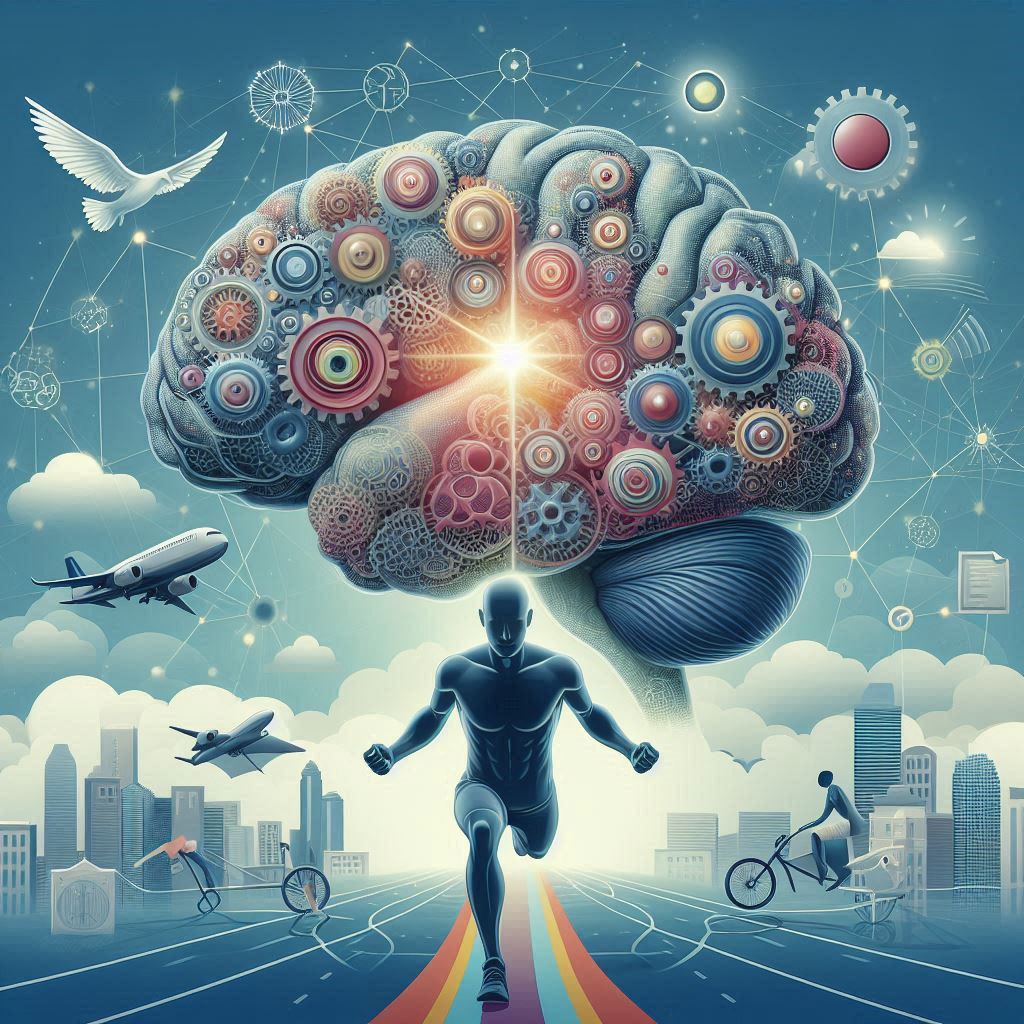Maximize Brain Function: How New Experiences Drive Cognitive Fitness
Introduction
Ever tried learning a new language or picking up a musical instrument you’ve never touched before? These activities do more than just add a new skill to your repertoire—they can significantly boost your cognitive fitness. Cognitive fitness, much like physical fitness, is about keeping your brain in top shape. But instead of lifting weights or running miles, you engage in mentally stimulating activities that challenge your brain in new ways. In this article, we’ll explore how novelty—the experience of trying something unfamiliar—plays a crucial role in maintaining and improving cognitive function.

What is Cognitive Fitness?
Cognitive fitness refers to the brain’s ability to perform well in areas like memory, attention, and problem-solving. It’s about maintaining mental sharpness and flexibility, which are essential for navigating the complexities of life. Just as physical exercise strengthens your muscles, engaging in mentally stimulating activities strengthens your brain.
The Role of Novelty in Brain Health
Novelty is the secret ingredient that spices up our cognitive workouts. When we step out of our comfort zones and try something new, our brains are forced to adapt and grow. This growth isn’t just figurative—it’s backed by science, which shows that novel experiences can lead to the formation of new neural connections.
The Science Behind Cognitive Fitness
Neuroplasticity: The Brain’s Ability to Adapt
One of the most remarkable features of the brain is its neuroplasticity—the ability to reorganize itself by forming new neural connections throughout life. This adaptability is crucial for learning and memory. Engaging in novel activities stimulates neuroplasticity, keeping your brain flexible and resilient.
How Novel Experiences Stimulate the Brain
The Role of Dopamine in Learning
When you try something new, your brain releases dopamine, a neurotransmitter associated with pleasure and reward. This dopamine boost makes the learning process enjoyable and helps reinforce the new neural pathways being formed.
Building New Neural Pathways
Each time you engage in a novel activity, your brain creates and strengthens neural pathways. The more you challenge your brain with unfamiliar tasks, the more robust these connections become, leading to improved cognitive function.
The Benefits of Engaging in Novel Activities
Enhanced Memory and Recall
Trying new things forces your brain to store and retrieve new information, which can improve your overall memory and recall abilities.
Improved Problem-Solving Skills
Novel activities require you to think on your feet and come up with creative solutions, which can enhance your problem-solving skills in everyday life.
Delaying Cognitive Decline
Research suggests that engaging in mentally stimulating activities can help delay the onset of cognitive decline, including conditions like dementia and Alzheimer’s disease.
Examples of Novel Activities for Cognitive Fitness
Learning a New Language
How Language Learning Boosts Cognitive Function

Learning a new language engages multiple areas of the brain, from vocabulary and grammar to pronunciation and comprehension. This multi-faceted challenge keeps your brain active and sharp.
Tips for Starting a New Language
Start with the basics—common phrases, numbers, and everyday vocabulary. Use language learning apps, take classes, or practice with native speakers to immerse yourself fully.
Playing Unfamiliar Musical Instruments
Cognitive Benefits of Learning an Instrument
Playing a musical instrument involves reading music, using fine motor skills, and coordinating both hands, all of which stimulate different parts of the brain.
Choosing the Right Instrument for You
Choose an instrument that interests you, whether it’s the piano, guitar, or something more unconventional like the ukulele. The key is to pick something that excites and challenges you.
Exploring Creative Hobbies
Painting, Sculpting, and Other Arts
Creative hobbies like painting or sculpting allow you to express yourself while also engaging your brain in new ways. These activities enhance your ability to think abstractly and improve spatial awareness.
The Cognitive Benefits of Creative Expression
Creative expression is linked to improved emotional regulation and problem-solving abilities. It also provides a therapeutic outlet for stress and anxiety.
Physical Activities with a Cognitive Twist
Dance and Movement-Based Exercises
Dance requires you to remember steps, stay in rhythm, and coordinate your movements—all while enjoying music. This combination of physical and mental exercise is excellent for cognitive fitness.
Sports that Challenge the Brain
Sports like tennis, badminton, or martial arts require quick thinking, strategy, and coordination, making them perfect for keeping your brain agile.
The Impact of Novelty on Emotional Well-being
Reducing Stress and Anxiety
Engaging in new activities can be a great stress reliever. The excitement of learning something new can distract you from everyday worries and provide a sense of accomplishment.
Boosting Motivation and Confidence
As you master new skills, your confidence grows. This boost in self-esteem can spill over into other areas of your life, making you more motivated to take on challenges.
How to Incorporate Novel Activities into Daily Life
Setting Goals for Cognitive Fitness
Set specific, achievable goals for your cognitive fitness journey. Whether it’s learning a new language or trying a new sport, having clear objectives can keep you motivated.
Finding Time for New Experiences
Incorporate novelty into your routine by setting aside time each week for new activities. Even 30 minutes a day can make a significant difference.
Balancing Novelty with Routine
While novelty is essential, it’s also important to balance it with routine. Too much change can be overwhelming, so find a rhythm that works for you.
Challenges and Misconceptions
The Myth of “Too Old to Learn”
It’s a common misconception that older adults can’t learn new things. In reality, the brain remains plastic throughout life, and engaging in new activities can be especially beneficial as we age.
Overcoming Fear of Failure
Trying something new often comes with the fear of failure. Embrace the learning process, and remember that mistakes are a natural part of growth.
Managing Frustration and Patience
Learning new skills can be frustrating at times. Practice patience, and focus on the progress you’re making, no matter how small.
Success Stories and Real-Life Examples

Individuals Who Transformed Their Cognitive Health
Countless individuals have enhanced their cognitive health by embracing novelty. From retirees learning new languages to professionals taking up new hobbies, the benefits are clear.
How Novelty Helped in Professional Growth
Engaging in novel activities can also lead to professional growth. It can improve creativity, problem-solving skills, and adaptability in the workplace.
The Future of Cognitive Fitness
Technological Innovations in Brain Training
The future of cognitive fitness is exciting, with advancements in brain-training apps, virtual reality experiences, and more. These tools offer new ways to engage and challenge the brain.
The Role of AI and Virtual Reality
AI and virtual reality are revolutionizing how we approach cognitive fitness, providing immersive and personalized experiences that adapt to individual needs.
Integrating Cognitive Fitness into Education and Healthcare
As awareness of cognitive fitness grows, we can expect to see it integrated more into education and healthcare. Schools may incorporate brain-training activities, while healthcare providers offer cognitive fitness plans for patients.
Conclusion
Cognitive fitness through novelty is a powerful way to keep your brain sharp and engaged. By embracing new challenges, you not only enhance your cognitive function but also improve your emotional well-being and overall quality of life. Whether it’s learning a new language, picking up a musical instrument, or trying a new sport, the key is to keep your brain active and open to new experiences.
FAQs
What is the best novel activity for improving cognitive function?
There’s no one-size-fits-all answer, as the best activity depends on your interests and current cognitive abilities. However, activities that challenge multiple areas of the brain, such as learning a new language or playing an instrument, are highly effective.
How often should I engage in novel activities to see benefits?
To see significant benefits, try to engage in novel activities at least a few times a week. Consistency is key to building and maintaining cognitive fitness.
Can cognitive fitness help with age-related memory loss?
Yes, engaging in novel activities can help slow down age-related cognitive decline and improve memory function.
Are there any risks associated with engaging in unfamiliar activities?
While engaging in novel activities is generally beneficial, it’s essential to start at a level that matches your abilities and gradually increase the difficulty to avoid frustration or burnout.
How do I stay motivated to continue challenging my brain?
Set clear goals, track your progress, and choose activities that genuinely interest you. Joining a group or finding a learning partner can also help keep you motivated.






